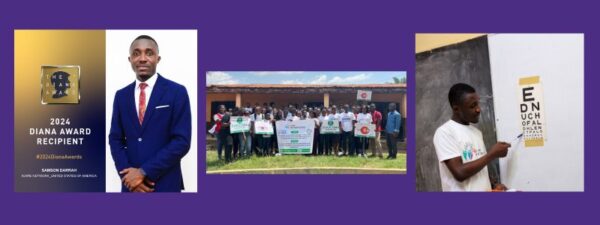In the quiet hum of the Biophotonics and Imaging Laboratory, Samson Darrah is driven by a vision that reaches far beyond the microscope. As a Ph.D. student in UW Bioengineering, this Ghanaian innovator is working to unravel new ways to diagnose and treat retinal anomalies early. But his impact isn’t confined to research.
After encountering students struggling with undiagnosed visual impairments and girls using unsafe materials for menstrual protection in Ghana Samson formed the non-profit iCare Network Ghana. The organization empowers communities with eye care services and menstrual health education, mobilizing a team of over 250 volunteers. “By providing eye screenings and menstrual health support to persons in underserved communities, iCare Network Ghana is improving education, opportunity and dignity?across Ghana,” Samson says.
To date, iCare has provided eye health services to nearly 4,000 people in Ghana and supported close to 1,000 young girls by supplying them with essential menstrual health products.
By providing eye screenings and menstrual health support to persons in underserved communities, iCare Network Ghana is improving education, opportunity and dignity across Ghana. -Samson Darrah
Samson’s above and beyond social action efforts were honored by the 2024 Diana Award and he is one of 200 awardees out of 1700 nominees who received the award.
Established in memory of Diana, Princess of Wales, the Diana Award is a prestigious honor given to young people aged 9-25 for their outstanding contributions to social action or humanitarian efforts.
Award recipients are nominated by adults who know the recipients in a professional capacity and want to highlight their impactful contributions to society. To qualify, recipients must have spent at least 12 months driving positive social change through activities such as advocacy, education, fundraising or providing essential services.
“Receiving the Diana Award is an incredible honor, and I am humbled to be recognized among so many young change-makers from around the world,” shares Samson. “This award is not just for me but for the dedicated team of volunteers and supporters at iCare Network Ghana who work tirelessly to make a difference in the lives of those in need.”
Samson invites students to get involved in the iCare Network to provide virtual or onsite eye care in Ghana. One of his goals is to send eye health professionals from the US to Ghana annually to help support their eye health services.
I chose the Bioengineering program at the University of Washington because of its exceptional reputation for innovation and interdisciplinary collaboration. -Samson Darrah
Working as an optometrist in Ghana, Samson noticed that most of the patients who came to the clinic often waited until their eye condition had reached an irreversible phase. His experience led to an interest in enhancing the early diagnosis of patient’s ocular conditions through better imaging for a more successful outcome. He was particularly interested in pursuing work with the retina because the conditions that affect that part of the eye are usually irreversible.
Following this passion, Samson joined UW Bioengineering specifically to work with Professor Ruikang (Ricky) Wang to use advanced imaging techniques to better understand the causes of retinal disorders and improve their early detection, treatment and care. “I chose the Bioengineering program at the University of Washington because of its exceptional reputation for innovation and interdisciplinary collaboration,” Samson says about his decision to pursue a bioengineering Ph.D.
In addition to the Diana Award, Samson has garnered other honors including the 2024 CooperVision International Travel Fellowship Award and the Optical Foundation Early Career Award.
Upon completion of his Ph.D. Samson hopes to go into industry as a research scientist and possibly work part-time as a professor. Outside of his research and non-profit work Samson enjoys playing the guitar, photography and watching educational documentaries on YouTube.



